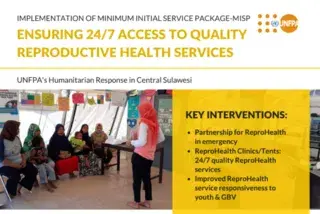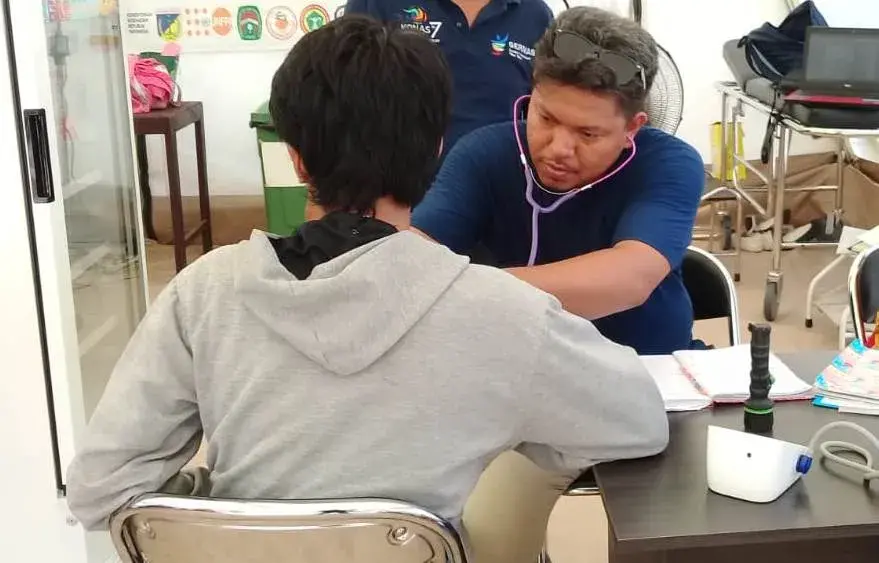Parliamentarians, senior government officials and representatives from civil society organizations and national non-governmental organizations recently came together in Jakarta to discuss and outline Indonesia’s progress in implementing the unfinished International Conference on Population and Development Programme of Action (ICPD) in the context of the Global Goals for Sustainable Development.
The half-day seminar, which was held on 16 December and saw 105 people participate, was jointly organized by Indonesia’s House Commission IX and UNFPA Indonesia. Along with discussing the unfinished ICPD agenda, the seminar also raised awareness among Indonesian parliamentarians on the overall performance of the Millennium Development Goals (MDGs) and the recently adopted Global Goals for Sustainable Development.
Officially opened by Mr. Dede Yusuf Macan Effendy, the Chairperson of House Commission IX, the seminar was divided into four sessions. The first session outlined the implementation of the ICPD unfinished agenda in Indonesia, with particular focus on family planning, reproductive health and the demographic dividend. The second session analysed the implementation of the MDGs (2000-2015) in Indonesia, reviewing the progress and challenges, while the third session highlighted the new global goals. The final session examined the role and contribution of Indonesia’s parliamentarians in promoting and implementing the unfinished ICPD agenda in the context of the global goals.
Mr. Dede underlined the importance of the ICPD Plan of Action as the first internationally agreed consensus on development and poverty reduction that serves as a comprehensive guide to people-centered development. While progress has been made worldwide, he said nationally, Indonesia had not yet managed to stabilize the spread of HIV, the contraceptive prevalence rate had stagnated and gender-based violence still needed urgent attention.

Mr. Dede Yusuf Macan Effendy, the Chairperson of House Commission IX, delivers his keynote speech at the Unfinished ICPD Agenda in the Context of the Global Goals for Sustainable Development seminar in Jakarta on 16 December 2015.
To address this situation, Mr. Dede emphasized to the room the commitment of House Commission IX to work closely with the Ministry of Health (MoH) and the National Family Planning Coordinating Board (BKKBN) to ensure that all programs set by the Government would benefit society. He added that the House Commission IX had also approved a five percent national budget for health in 2016 and had improved budget for family planning programme.
Mr. Surya Chandra Surapaty, the Chairperson of BKKBN, presented a comprehensive outline on the issues of family planning, population development, family welfare and the demographic dividend in Indonesia. Acknowledging that Indonesia had achieved significant progress in implementing the ICPD plan of action within the MDGs framework since the 1994 ICPD meeting in Egypt, he agreed that there were still areas that needed further improvement such as maternal mortality and infant mortality rates. Mr. Surya added that the necessary policies should be integrated among line agencies to harness the country’s demographic dividend.
Dr. Anung Sugihantono from the Ministry of Health told the room that in order to achieve the commitments within the recently-adopted global goals, he believed that all government institutions needed to synergize their efforts and share responsibility in achieving all the set targets. This includes increasing budget allocations for social development programs and ensuring better access to health services, education, and justice for all people. He added that the private sector, civil society, academia, and the media also played an important role in achieving these goals.
Dr. Subandi Sardjoko from the National Planning Development Board (BAPPENAS) said that Indonesia continued to face major challenges in achieving human development goals, especially in the areas of education and health. To successfully execute the new global goals, Dr. Subandi said that governments needed to set national targets against the indicators within the global frameworks, stressing the importance of engaging all stakeholders such as parliamentarians, civil society and academics before March 2016 to provide ample opportunity for more participation in executing the goals. He added that the global goals would not be realized if the role and commitment of all relevant stakeholders at the national and regional level was not at the centre of the objectives set in the goals. Dr. Subandi ended his presentation by emphasizing that coordination among related ministries and agencies needed to be strengthened to pursue the targets.

From left: Dr. Adang Sudrajat MM.AV, House Commission IX; Dr. Nurhayati Assegaf, Head of Inter-Parliamentary Union; Mr. Surya Chandra Surapaty, the Chairperson of BKKBN; Dr. Anung Sugihantono, Director General of Nutrition Management and Mother and Child Health, the Ministry of Health and; Dr. Subandi Sardjoko, the Deputy Minister for Human Resources Development and Cultural Affairs at BAPPENAS at the Unfinished ICPD Agenda in the Context of the Global Goals for Sustainable Development seminar.
A special parliamentary committee on the Global Goals for Sustainable Development has been formed to promote greater alignment to national plans and legislations and to ensure effective monitoring and evaluation. Dr. Nurhayati Assegaf, Head of Badan Kerjasama Antar Parlemen, Inter-Parliamentary Union - BKSAP, explained that the committee had identified a work programme to raise awareness on the goals among the parliamentarians. She added that parliamentarians played an important role in achieving these ambitious goals within the 15-year deadline, such as proposing and endorsing legislation to support their implementation, prioritizing a relevant budget for the goals and to regularly monitor the policies related to them.
“The members of parliament have their hands to monitor the programme in the field through their constituents, including Governors and Bupaties during the recess,” she told the room.
Dr. Nurhayati recommended the parliament work closely with the government to prepare the indicators for the goals and to set up the national policies to achieve them. She added that it was important for the parliamentarians to socialize the goals to their constituents in a simple way, urging them to also provide recommendations to the relevant commissions in connection with the achievement of the goals and to provide solutions to existing challenges. She suggested to use local languages to disseminate the Global Goals for Sustainable Development in the field such as “Pembangunan Berkelanjutan”.



